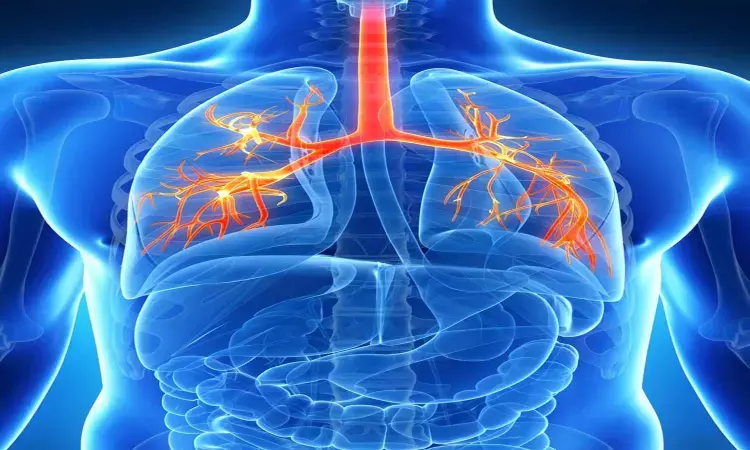- Home
- Medical news & Guidelines
- Anesthesiology
- Cardiology and CTVS
- Critical Care
- Dentistry
- Dermatology
- Diabetes and Endocrinology
- ENT
- Gastroenterology
- Medicine
- Nephrology
- Neurology
- Obstretics-Gynaecology
- Oncology
- Ophthalmology
- Orthopaedics
- Pediatrics-Neonatology
- Psychiatry
- Pulmonology
- Radiology
- Surgery
- Urology
- Laboratory Medicine
- Diet
- Nursing
- Paramedical
- Physiotherapy
- Health news
- Fact Check
- Bone Health Fact Check
- Brain Health Fact Check
- Cancer Related Fact Check
- Child Care Fact Check
- Dental and oral health fact check
- Diabetes and metabolic health fact check
- Diet and Nutrition Fact Check
- Eye and ENT Care Fact Check
- Fitness fact check
- Gut health fact check
- Heart health fact check
- Kidney health fact check
- Medical education fact check
- Men's health fact check
- Respiratory fact check
- Skin and hair care fact check
- Vaccine and Immunization fact check
- Women's health fact check
- AYUSH
- State News
- Andaman and Nicobar Islands
- Andhra Pradesh
- Arunachal Pradesh
- Assam
- Bihar
- Chandigarh
- Chattisgarh
- Dadra and Nagar Haveli
- Daman and Diu
- Delhi
- Goa
- Gujarat
- Haryana
- Himachal Pradesh
- Jammu & Kashmir
- Jharkhand
- Karnataka
- Kerala
- Ladakh
- Lakshadweep
- Madhya Pradesh
- Maharashtra
- Manipur
- Meghalaya
- Mizoram
- Nagaland
- Odisha
- Puducherry
- Punjab
- Rajasthan
- Sikkim
- Tamil Nadu
- Telangana
- Tripura
- Uttar Pradesh
- Uttrakhand
- West Bengal
- Medical Education
- Industry
Brensocatib may reduce exacerbation rate in bronchiectasis patients

Delhi: Brensocatib significantly prolongs time to first pulmonary exacerbation over the 24-week treatment period versus placebo in patients with non-cystic fibrosis bronchiectasis (NCFBE), show results from phase 2 WILLOW study.
The findings of the study were presented at the virtual American Thoracic Society (ATS) 2020 conference by James D. Chalmers, British Lung Foundation Chair of Respiratory o Research at the University of Dundee, United Kingdom.
Brensocatib is a novel, oral, reversible inhibitor of dipeptidyl peptidase 1 (DPP1). It is developed by Insmed for the treatment of bronchiectasis and other inflammatory diseases. Brensocatib received breakthrough therapy designation from the U.S. Food and Drug Administration in June 2020 for the treatment of adult patients with NCFBE for reducing exacerbations. Insmed plans to initiate a Phase 3 program for brensocatib in bronchiectasis in the second half of 2020.
Current bronchiectasis guidelines recommended mucoactive therapies and airway clearance to target abnormally disorderly clearance and macrolides in inhaled antibiotics to target bacterial colonization or infection. But currently, there is no treatment that targets the nucleophilic inflammation that is the hallmark of bronchiectasis.
The study was conducted to evaluate the safety and efficacy of brensocatib in patients with non-cystic fibrosis bronchiectasis.
For the purpose, the researchers enrolled 256 bronchiectasis patients having at least two documented pulmonary exacerbations within the previous year. 87 patients (mean age, 64 years; 63.2% women) were randomly assigned to receive placebo, 82 patients (mean age, 64.6 years; 69.5% women) to receive brensocatib 10 mg and 87 patients (mean age. 63.7 years; 71.3% women) to receive brensocatib 25 mg.
The primary endpoint was first time to first pulmonary exacerbation over the 24-week treatment period.
Key findings of the study include:
- Brensocatib 10 mg (HR = 0.58) and brensocatib 25 mg (HR = 0.62) significantly prolonged time to first exacerbation over 24 weeks compared with placebo.
- The rate of exacerbations over the 24-week treatment period was 48.3% in the placebo group compared with 31.7% in the brensocatib 10 mg group and 33.3% in the brensocatib 25 mg group.
- The annualized exacerbation rate was 1.37 exacerbations per patient per year in the placebo group compared with 0.88 exacerbations per patient per year in the brensocatib 10 mg group and 1.03 exacerbations per patient per year in the brensocatib 25 mg group.
- Both 10 mg and 25 mg brensocatib doses significantly reduced sputum neutrophil elastase concentration compared with placebo, which was sustained throughout the study.
- Patients treated with brensocatib who achieved sputum neutrophil elastase below the limit of quantification after baseline had a lower incidence of pulmonary exacerbations compared with those who had a quantifiable level of sputum neutrophil elastase after baseline. Risk for exacerbation in these patients was 72% lower.
- Adverse events resulting in treatment discontinuation were higher in the placebo group (10.6%) compared with brensocatib 10 mg (7.4%) and 25 mg (6.7%). The most common adverse events in patients treated with brensocatib were cough, headache, sputum increase, dyspnea, infective exacerbation of bronchiectasis, diarrhea, fatigue and upper respiratory tract infection.
- Rates of skin events, including hyperkeratosis, were 11.8% in the placebo group, 14.8% in the 10 mg brensocatib group and 23.6% in the 25 mg brensocatib group.
- Rates of infections considered adverse events of special interest were 17.6% with placebo, 13.6% with 10 mg brensocatib and 16.9% with 25 mg brensocatib.
- Rates of dental events were 3.5% with placebo, 15% with 10 mg brensocatib and 10.1% with 25 mg brensocatib.
"The WILLOW study met its primary endpoint, with brensocatib significantly prolonging time to first pulmonary exacerbation over the 24-week treatment period versus placebo (p=0.027 for the 10 mg group; p=0.044 for the 25 mg group)," concluded the authors.
Findings from the trial, "Assessment of INS1007 in Subjects With Non-Cystic Fibrosis Bronchiectasis," were presented at the virtual American Thoracic Society (ATS) 2020 conference.
Dr Kamal Kant Kohli-MBBS, DTCD- a chest specialist with more than 30 years of practice and a flair for writing clinical articles, Dr Kamal Kant Kohli joined Medical Dialogues as a Chief Editor of Medical News. Besides writing articles, as an editor, he proofreads and verifies all the medical content published on Medical Dialogues including those coming from journals, studies,medical conferences,guidelines etc. Email: drkohli@medicaldialogues.in. Contact no. 011-43720751


